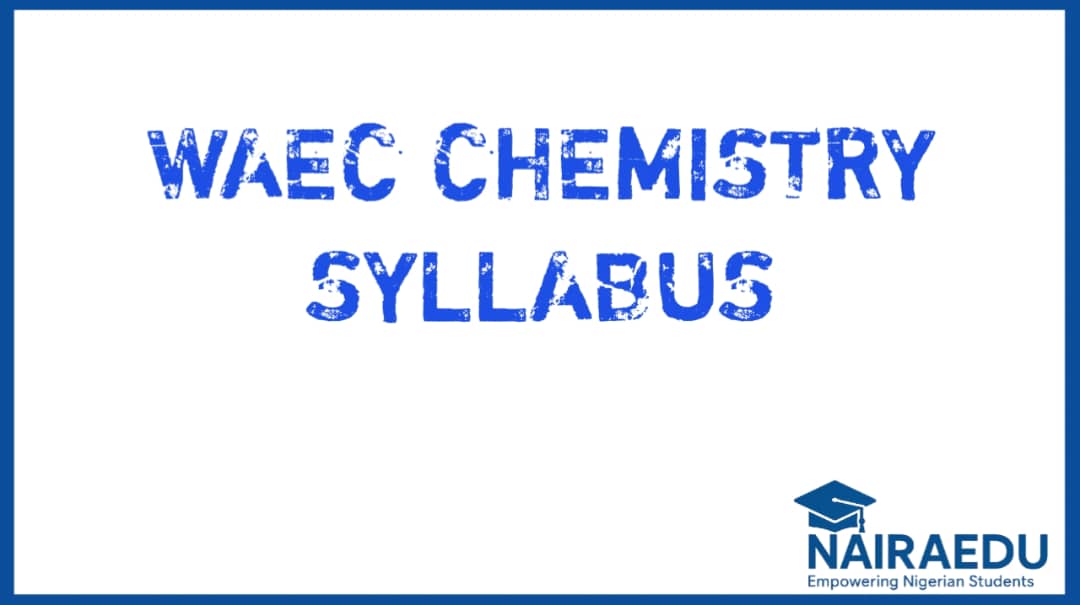Preparing for the WAEC Chemistry 2026 examination requires a strategic and well structured approach. The WAEC Chemistry syllabus is your best roadmap, outlining all the topics you must master, the skills you need to develop, and the format of the questions you will face. At Nairaedu.com, we understand that Chemistry can be a complex subject, but with the right guidance, you can achieve an excellent grade.
This detailed guide breaks down the entire syllabus into clear, manageable sections. We will cover the key topics, explain the exam format, and provide expert tips on how to prepare effectively. By following this structured approach, you will build the confidence and knowledge necessary to ace your WAEC Chemistry exam and lay a strong foundation for future academic pursuits.
Aims and Objectives of the WAEC Chemistry Syllabus
The WAEC Chemistry syllabus is carefully designed to guide candidates in their preparation by focusing on essential areas of study. Its key aims include:
- Foundational Knowledge: Helping students grasp the core theories, principles, and applications of Chemistry.
- Skill Development: Cultivating essential laboratory skills, promoting a strong awareness of laboratory hazards and safety protocols.
- Interdisciplinary Connection: Highlighting the relationships between Chemistry and other core subjects like Physics, Biology, and Mathematics.
- Real-World Relevance: Demonstrating the crucial role of Chemistry in industry, technology, environmental sustainability, and everyday life, while also addressing its potential hazards.
- Critical Thinking: Fostering logical reasoning and analytical skills to help students solve complex problems effectively.
By understanding these aims, you can better appreciate the holistic nature of the syllabus and focus your studies on developing a well rounded understanding of the subject.
WAEC Chemistry Examination Scheme
The WAEC Chemistry exam is a comprehensive assessment divided into three main papers. Each paper tests a different aspect of your knowledge and skills, from theoretical concepts to practical applications.
Paper 1: Objective Questions
- Format: This paper consists of 50 multiple-choice questions.
- Duration: 1 hour.
- Weighting: This paper accounts for 33.3% of the total marks (50 marks).
- Focus: It tests your knowledge of fundamental concepts, definitions, and theories from all parts of the syllabus. It requires quick recall and application of basic principles.
Paper 2: Essay Questions
Format: This paper includes a combination of short and long structured questions.
Duration: 2 hours.
Weighting: This paper contributes 33.3% of the total marks (100 marks).
Breakdown:
- Section A: Consists of compulsory, common topics for all candidates.
- Section B: Includes a selection of essay questions, some of which may be country-specific.
Focus: This paper requires you to demonstrate a deeper understanding of topics, articulate your points clearly, and show your working for calculations.
Paper 3: Practical Exam/Alternative to Practical
- Format: A hands-on practical exam for school candidates, or an alternative practical paper for private candidates.
- Duration: 2 hours for school candidates; 1 hour 30 minutes for private candidates.
- Weighting: This paper contributes 33.3% of the total marks (50 marks).
- Focus: It tests your ability to perform experiments, make accurate observations, record data, and analyze results.
Understanding this structure is the first step toward effective time management and targeted preparation for the exam.
Detailed Breakdown of the WAEC Chemistry 2026 Syllabus
The WAEC Chemistry syllabus is categorized into key areas of study. Below is a comprehensive breakdown of the essential topics you need to master.
1. Introduction to Chemistry and Basic Concepts
- Scientific Method: Understanding the systematic approach to scientific inquiry, including observation, hypothesis formation, experimentation, and conclusion.
- Measurement: Mastery of SI units and proper use of laboratory apparatus for measuring mass, volume, and temperature.
- Matter: Differentiating between elements, compounds, and mixtures.
2. Atomic Structure and the Periodic Table
- Atomic Theory: Study the evolution of atomic models from Dalton to Bohr, and modern quantum mechanical model.
- Sub-atomic Particles: Understand the properties of protons, neutrons, and electrons.
- Periodic Trends: Analyze periodic trends in properties like atomic radius, ionization energy, electron affinity, and electronegativity.
- Classification of Elements: Learn about the periodic law and how elements are classified into groups and periods.
3. Chemical Bonding and Stoichiometry
- Types of Bonds: Understand the formation and properties of ionic, covalent, and metallic bonds.
- Chemical Equations: Master the art of writing and balancing chemical equations.
- The Mole Concept: This is a crucial area. Be able to calculate molar mass, mass concentration, and apply the mole concept to solve problems involving chemical reactions, gas laws, and solution stoichiometry.
4. States of Matter and Gas Laws
- Kinetic Theory: Understand the kinetic theory of matter and its application in explaining the properties of solids, liquids, and gases.
- Gas Laws: Study Boyle’s Law, Charles’s Law, Gay-Lussac’s Law, and the Combined Gas Law. Practice solving problems using the ideal gas equation.
5. Energy Changes in Chemical Reactions (Energetics)
- Thermodynamics: Differentiate between exothermic and endothermic reactions.
- Enthalpy Changes: Understand enthalpy changes of formation, combustion, solution, and neutralization.
- Hess’s Law: Be able to use Hess’s Law to calculate enthalpy changes for complex reactions.
6. Acids, Bases, and Salts
- Definitions: Understand the Arrhenius, Brønsted-Lowry, and Lewis theories of acids and bases.
- pH Scale: Know how to calculate and interpret pH values.
- Salts: Study the preparation, properties, and uses of different types of salts.
7. Organic Chemistry
This section is one of the largest and most important areas of the syllabus.
- Hydrocarbons: Understand the nomenclature, isomerism, and reactions of alkanes, alkenes, and alkynes.
- Functional Groups: Master the properties and reactions of key functional groups, including alcohols, carboxylic acids, esters, and amines.
- Polymers: Learn about the types of polymerization (addition and condensation) and the properties of common polymers like nylon and PVC.
8. Electrochemistry and Chemical Equilibrium
- Redox Reactions: Be able to identify oxidation and reduction processes and balance redox equations.
- Electrolysis: Understand the principles of electrolysis and its applications in electroplating and extraction of metals.
- Equilibrium: Know the factors affecting equilibrium and apply Le Chatelier’s principle to predict shifts in equilibrium.
Key Practical Skills for WAEC Chemistry
The practical examination is a significant component of your final grade. Here are the core skills you must master:
- Titration: Be able to perform accurate acid-base and redox titrations to determine unknown concentrations. Practice reading burettes and pipettes correctly.
- Qualitative Analysis: Master the systematic identification of cations (e.g., Na
+
, Fe
2+
, Cu
2+
) and anions (e.g., SO_4
2−
, CO_3
2−
) in solution. - Gas Tests: Know the characteristic tests for common gases, such as hydrogen, oxygen, carbon dioxide, and ammonia.
- Laboratory Safety: Understand and follow all safety measures, including the proper handling of chemicals and apparatus.
Effective Strategies for Exam Success
A smart study plan is key to excelling. Here are some proven tips:
- Create a Study Timetable: Break the syllabus into manageable topics and allocate specific time slots for each. Prioritize challenging areas and ensure you have enough time for revision.
- Practice Past Questions: This is arguably the most effective preparation method. Solving past WAEC questions helps you understand the exam format, identify key topics, and improve your time management skills.
- Master Your Formulas: Chemistry is highly mathematical. Create a formula sheet and memorize all key equations for topics like Stoichiometry, Gas Laws, and Energetics.
- Use the Right Resources: Supplement your study with recommended textbooks, reliable online resources, and video tutorials that demonstrate practical procedures.
- Form a Study Group: Discussing concepts with peers can help clarify difficult topics and expose you to new perspectives.
ALSO READ:
WAEC Syllabus for Biology 2026, Study Guide & Key Topics
Secrets of Scoring 300+ in JAMB 2026
NABTEB Chemistry 2025 Questions And Answers
Download the Official WAEC Chemistry Syllabus PDF
For your convenience, we have provided a downloadable PDF of the WAEC Chemistry syllabus. This document contains all the topics, examination schemes, and objectives in one place, ensuring you have everything you need for your preparation. Click the link below to get your copy.
WAEC-Chemistry-Syllabus
DOWNLOAD
At Nairaedu.com, we are committed to helping you succeed in your exams. A top-tier grade in WAEC Chemistry is achievable with consistent practice, a structured approach, and the right resources. If you have any questions or need additional support, feel free to leave a comment below. Good luck with your studies!

Mr. Femi is an education blogger who simplifies exam updates and study tips for Nigerian students. His goal is to make learning smart, easy, and rewarding.


1 thought on “WAEC Syllabus for Chemistry 2026”